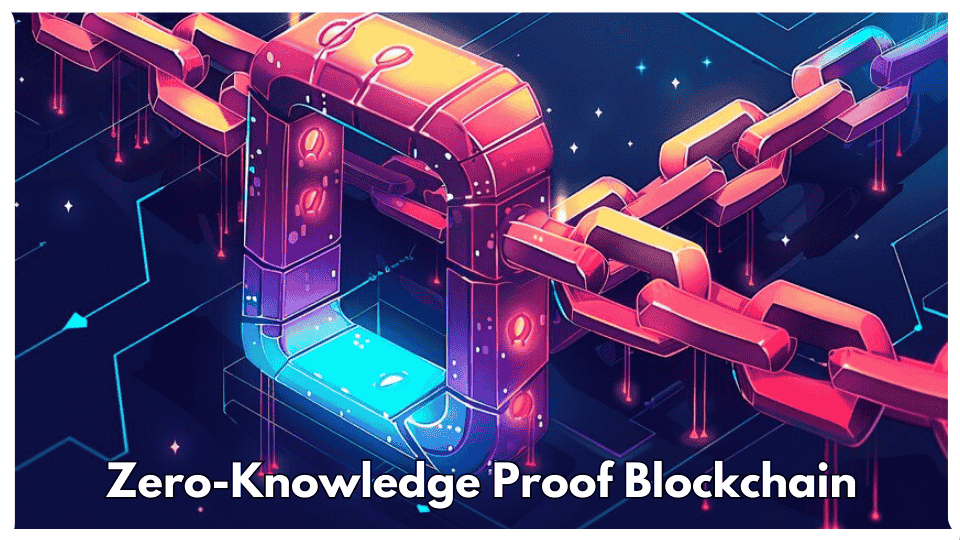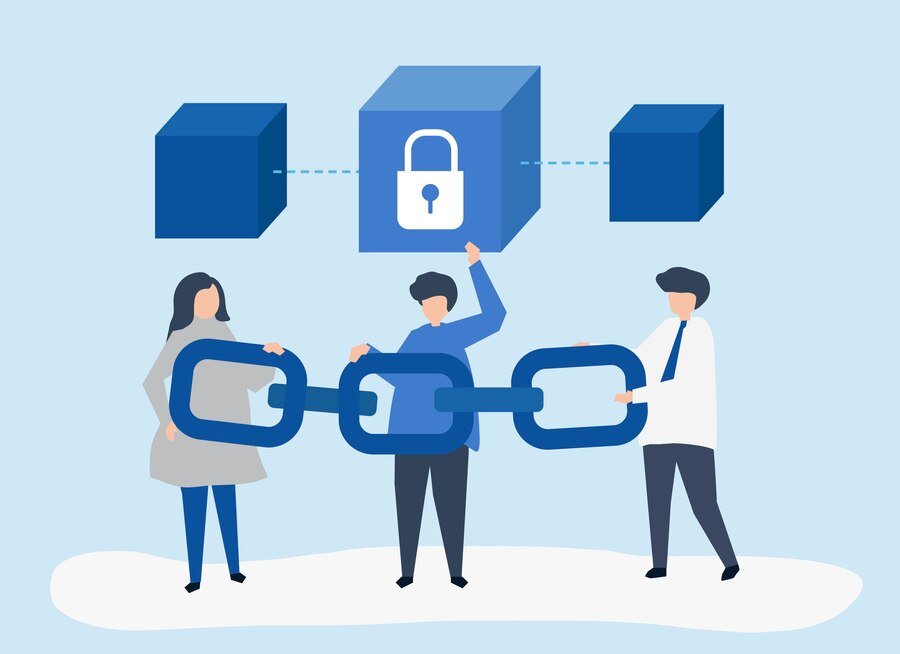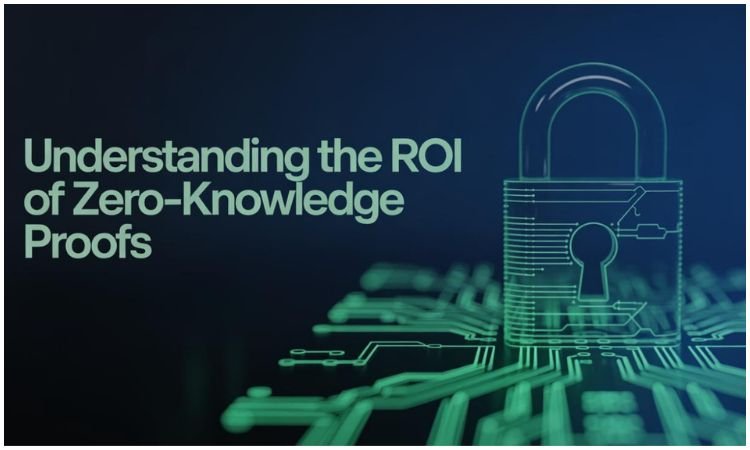
Introduction to Zero-Knowledge Proof Blockchain
By 2022, more than 22 billion records will be exposed due to data breaches. Highlighting the urgent need for better privacy solutions based on blockchain, by 2025, Zero-Knowledge Proof (ZKP) blockchain will become a game changer. This ensures that information can be verified without revealing sensitive information. This technology eliminates blockchain privacy challenges by protecting user details while maintaining transparency and security.
What Is a Zero-Knowledge Proof?
Zero-Knowledge Proof (ZKP) is a cryptographic technique where an authenticator can prove to an authenticator that they have certain information without revealing it. This 1980s invention made it possible to verify data authenticity by keeping sensitive data safe. Imagine proving you’re over 18 without showing your date of birth. That’s how ZKP works! ZKP is a powerful privacy tool that increases trust without transferring unnecessary details.
What Is a Zero-Knowledge Proof Blockchain?
Blockchain uses ZKP for ensuring that transactions and data transfers are made with higher anonymity. In ZKPs, a user can prove to another user that a transaction exists without revealing the names or any other information present in that transaction. What this invention does is protects the privacy of users and integrity of the blockchain.
The Importance of Privacy and Anonymity in Blockchain
Data breaches and identity theft are the rampant cases in blockchain, hence privacy and anonymity. In banking, healthcare, and supply chain management, safe, private transactions are growing in size with improvements in blockchain technology. The Zero-Knowledge Proof Blockchain allows people to control their data as they go through verifiable transactions. It makes the internet safer.
Understanding Zero-Knowledge Proof Technology
- Zero-Knowledge Proof Algorithm: Zero-Knowledge Proof uses a mathematical authentication process. Through this technique, the prover manages to convince the verifier without revealing his knowledge. Usually, the prover and verifier proceed through man
Types of Zero-Knowledge Proofs: zk-SNARKs and zk-STARKs
zk-SNARKs and zk-STARKs are among the most widely known types of Zero-Knowledge Proofs.
Tiny size of proof and fast verification times are some of the features which make zk-SNARK suitable for effective use in blockchain applications.
A major benefit of zk-STARKs is that it eliminates trusted setup; this gives them a higher scalability and transparency but increases the proof files and verification time.
The Differences Between Zero-Knowledge Proof and Zero-Knowledge Proof Technology
Zero-information Proof allows one to prove information without allowing him to know what he is disclosing, whereas Zero-Knowledge Proof Technology realizes the concept in other systems such as blockchain. ZKP technology employs algorithms and protocols to secure, private transactions as opposed to Zero-Knowledge Proof theory.
Benefits of Combining Zero-Knowledge Proofs With Blockchain

Enhanced Privacy and Security
he inclusion of ZKPs in blockchain increases privacy and security. Through anonymous transactions, users would be protected from thefts and fraud.
Improved Scalability
The Zero-Knowledge Proof Blockchain reduces processing and storage of data within a blockchain. ZKPs increase the scalability of the blockchain network. The proof of validity would be recorded within the blockchain network and not the entire transaction
Regulatory Compliance
ZKPs enable data privacy to be aligned with growing regulatory demands. To achieve transparency and user privacy, an organization may implement regulation compliance without revealing the sensitive data.
Interoperability Between Blockchain Networks
Zero-Knowledge Proofs enable safe communication between blockchain networks. ZKPs enhance interoperability and cooperation within the blockchain ecosystem by letting one network validate transactions from the other network without revealing the actual information.
Drawbacks: Security Risks, Challenges with Maintaining PII
However, KBA also has notable downsides. Using personal information poses significant security risks-perceptible to the PII. In this case, if the information is breached, the whole authentication process may be compromised.
Practical Applications of Zero-Knowledge Proof Blockchain
Verifiable Credentials and Decentralized Identifiers (DIDs)
ZKPs allow a person to prove his identity or credentials without revealing his real information through verifiable credentials and decentralized identities. It has immense applications in education and employment
Smart Contracts and Zero-Knowledge Proofs
Smart contracts might apply zero knowledge proofs to make secrets held in the agreement secret. It promotes anonymity as well as integrity in executing a contract
Cryptocurrency Applications: Privacy Coins
Zcash and Monero employ Zero-Knowledge Proofs to keep transactions private. User names and amounts in a transaction are considered private with such currencies.
Zero-Knowledge Rollups for Scaling
Zero-Knowledge rollups roll up multiple transactions into one proof for scalable blockchain processing and confirmation. This method prevents network congestion without sacrificing wallet privacy.
Proof of Reserves for Exchanges
ZKPs allow exchanges to prove its reserves without revealing its balance sheet. Such openness to financial information keeps end-user trustworthy.
Implementation and Challenges
How Yushu Excellence's Zero-Knowledge Proof Blockchain Works
Zero-Knowledge Proof in Yushu Excellence Blockchain sustains private transactions using the zk-SNARKs. There is the protection of user data with verification that is fast on the platform to balance between privacy and speed.
Performance Trade-offs and Computational Costs
ZKPs enhance on issues such as privacy and scalability but incur additional computational costs and performance trade-offs. Blockchain systems may face complications with algorithm complexity and processing power.
Implementation Challenges in Existing Blockchain Systems
Existing blockchain networks will face challenges on interoperability with ZKPs. These can be compatibility issues with existing protocols, user resistance, and enhancement of infrastructure. Factors
Security Considerations and Potential Vulnerabilities
Zero-Knowledge Proofs, as they are beneficial in several ways, do have security weaknesses. Spoofing and implementation flaws, for example, need to be prevented to secure the ZKP system.
Comparison with Other Privacy-Enhancing Technologie
Ring Signatures
Ring signatures provide anonymity as a group of signers would be able to make a signature that doesn’t pinpoint the individual signer. Though useful, ring signatures are not nearly as powerful in the use of verification as ZKPs.
Confidential Transactions
Confidential transactions can possibly hide transaction values and potentially protect privacy. It doesn’t come close to the level of proof without disclosure like what ZKPs provide.
When to Choose Zero-Knowledge Proofs
Zero-Knowledge Proofs prove to be of great utility when all concerns about high privacy, scalability, and regulatory compliance are in sight. Its ability to prove knowledge without revealing information makes it a preferred choice for applications demanding confidentiality.
Future Developments in Zero-Knowledge Proof Blockchain

Emerging Research and Potential Advancements
Improvements in ZKP technology will continue and, over time, are expected to manifest scaling, performance, and usability improvements. Other innovations, such as more efficient algorithms and friendlier, easier-to-deploy implementations, might eventually bring ZKPs to a much broader field of applications.
Anticipated Impact on Blockchain Technology
Once matured, the incorporation of ZKP technology into blockchain is expected to redefine accepted standards for privacy and security. Efforts to better privacy make blockchain solutions more attractive to more users and organisations worldwide, which can influence mass adoption.
Use Cases for Zero-Knowledge Proof Blockchain
Financial Services
ZKPs use in the financial sector permits secure transactions, ensures regulatory compliance, and prevents fraud, thereby providing a trusted environment for users and institutions.
Healthcare
ZKPs shall enable the sharing of patients’ data confidentially while encouraging collaborations among the healthcare providers without violating any confidentiality to the patients.
Supply Chain Management
ZKPs will be able to verify the authenticity of products and transactions in the supply chain management without compromising any information regarding suppliers. This creates trust among the stakeholders.
Digital Identity Verification
Digital identity based on ZKPs services enables users to prove their identities for various services with minimal exposure of personal data and encourages user privacy over the digital environment.
Partner Use Cases: Real-World Examples
Some real world applications of Zero-Knowledge Proof Blockchain can be seen in the industry sectors. There are examples of companies that focus solely on private currency, such as Zcash and Monero, while others like uPort and Sovrin focus on employing ZKPs for decentralized identity solutions.
Conclusion: The Future of Privacy in Blockchain
Zero-Knowledge Proof Blockchain: A revolutionary advancement that guarantees privacy, security, and scalability for digital transactions. This is because the demand for secure and private communications is increasing. Integrating these mechanisms into blockchain systems could shape the future of digital privacy. various industries Recognize the value of stronger privacy measures Therefore, implementing zero-knowledge proof technology is not just a possibility. But it is a necessity of the new era.
About Yushu Excellence
Yushu Excellence is a leading company specializing in ZKP-based authentication, providing advanced solutions for secure and private online interactions. By leveraging zero-knowledge verification Companies are thus able to identify and monitor behavior without revealing sensitive information.
Yushu Excellence uses zk-SNARKs (zero knowledge shortened non-interactive arguments) for fast and secure verification while maintaining complete user anonymity. This approach guarantees privacy without compromising authenticity. This sets a new standard in privacy-focused technology.







